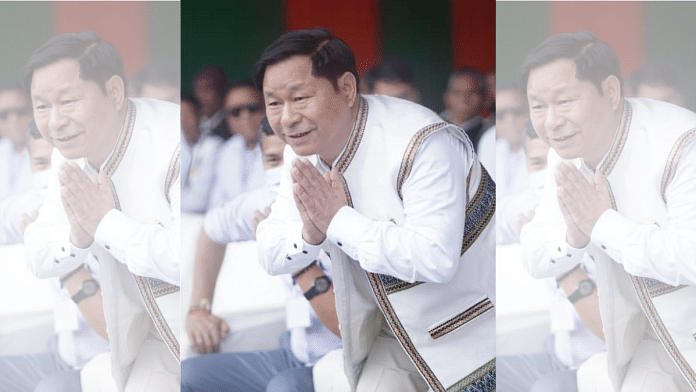New Delhi: A voter’s right to know about election candidates is absolute, but it doesn’t require them to lay out their life threadbare for examination as they too are entitled to “privacy,” the Supreme Court said Tuesday.
A division bench of justices Aniruddha Bose and Sanjay Kumar made this observation while overruling a July 2023 judgment of the Gauhati High Court, which invalidated the election of Independent candidate Karikho Kri from Tezu (ST) assembly constituency in Arunachal Pradesh.
In April 2019, the high court set aside Kri’s election for corrupt practice because he failed to declare ownership of three vehicles.
Reversing the HC finding, the SC made a pertinent observation regarding disclosure of assets, which is compulsory given its several past judgements.
Non-disclosure of each and every asset would not amount to a “defect of a substantial character” so as to invalidate election, the bench said.
The judges added that they were not inclined to accept the blanket proposition that a candidate has to declare every movable property that he or his dependent family members own, unless this is a sizeable asset in itself or reflect upon candidature, in terms of lifestyle, and required to be disclosed.
“His ‘right to privacy’ would still survive as regards matters which are of no concern to the voter or are irrelevant to his candidature for public office,” they said, giving examples of clothing, shoes, crockery, stationery and furniture.
The bench, however, clarified that there cannot be any hard and fast or straitjacketed rule as to when the non-disclosure of a particular movable asset would amount to a “defect of a substantial character.”
“For example, a candidate and his family who own several high-priced watches, which would aggregate to a huge figure, would obviously have to disclose the same as they constitute an asset of high value and also reflect upon lavish lifestyle.”
Suppression of such articles would constitute ‘undue influence’ upon the voter as that relevant information is being kept away, it explained.
But if a candidate and his family members each own a simple watch, suppression of their value may not amount to a defect at all, said the court, adding each case would, therefore, have to be judged on its own facts.
There is a need to distinguish between substantial and insubstantial issues while considering the validity of a nomination, it added.
In line with this principle, the bench overruled the Gauhati HC’s decision to negate Kri’s election.
Charges against MLA
Kri was accused by the rival Congress candidate Nuney Tayang for suppressing material particulars in his election affidavit under the Conduct of Election Rules.
Kri had not disclosed ownership of certain vehicles and dues of municipal and property taxes as well as not declared a ‘No Dues Certificate’ regarding government accommodation, his rival alleged.
The vehicles in question were a scooty and a van registered in the name of his wife, and a motorcyle was in the name of his second son.
In defence, Kri claimed that the scooty and the van were sold in 2009 and 2017. The motorcycle, he said, was gifted in 2014.
But the HC concluded that notwithstanding their status, the three vehicles were in the names of his wife and son at the time of his nomination and scrutiny of papers.
It held that according to the Motor Vehicles Act, the person in whose name the motor vehicle was registered should be treated as the owner, but this was not disclosed in the affidavit.
Overturning this, the SC said: “Mere failure to get registered the new owner of an already registered vehicle does not mean that sale/gift transaction would stand invalidated and such a vehicle, despite being physically handed over to the new owner, cannot, by any stretch of imagination, be treated as still being in the possession and control of the former owner.”
Once it is accepted that the three vehicles were either gifted or sold before the filing of the nomination, they cannot be considered to be still owned by his wife and son, the bench said. “Hence, it cannot be treated as an attempt on Kri’s part to unduly influence the voters.”
“Karikho Kri had declared the value of the movable assets of his dependent family members and himself as Rs 8,41,87,815. The value of the three vehicles, by comparison, would be a mere miniscule. In any event, suppression of their value would have no impact on the declaration of wealth and such non-disclosure could not be said to amount to ‘undue influence’,” the SC ruled.
On the non-disclosure of dues of government accommodation dating back to his MLA tenure from 2009 to 2014, the SC said it cannot be regarded as a “defect of any real import,” particularly when there were no actual outstanding dues payable by Kri in this regard.
The court noted that Kri did submit the relevant documents after Tayang raised an objection before the returning officer. “The most important aspect to be noted is that there were no actual dues and the failure to disclose that he had been in occupation of government accommodation…cannot be treated as a defect that is of substantial character so as to taint his nomination and render its acceptance improper.”
As for the failure to disclose the dues of municipal/property taxes, this cannot be held to be a non-disclosure at all because he declared these details in another part of the affidavit, it said. “This could be an error.”
“…every defect in the nomination cannot straightaway be termed to be of such character as to render its acceptance improper and each case would have to turn on its own individual facts, insofar as that aspect is concerned,” the top court asserted.
(Edited by Tony Rai)
Also Read: ‘He is defying Supreme Court’ — what SC said on TN governor’s refusal to induct Ponmudi into cabinet



